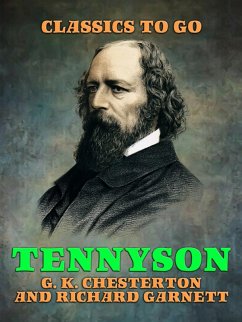Excerpt: "It was merely the accident of his hour, the call of his age, which made Tennyson a philosophic poet. He was naturally not only a pure lover of beauty, but a pure lover of beauty in a much more peculiar and distinguished sense even than a man like Keats, or a man like Robert Bridges. He gave us scenes of Nature that cannot easily be surpassed, but he chose them like a landscape painter rather than like a religious poet. Above all, he exhibited his abstract love of the beautiful in one most personal and characteristic fact. He was never so successful or so triumphant as when he was describing not Nature, but art. He could describe a statue as Shelley could describe a cloud. He was at his very best in describing buildings, in their blending of aspiration and exactitude. He found to perfection the harmony between the rhythmic recurrences of poetry and the rhythmic recurrences of architecture."
Dieser Download kann aus rechtlichen Gründen nur mit Rechnungsadresse in A, B, BG, CY, CZ, D, DK, EW, E, FIN, F, GR, HR, H, IRL, I, LT, L, LR, M, NL, PL, P, R, S, SLO, SK ausgeliefert werden.


